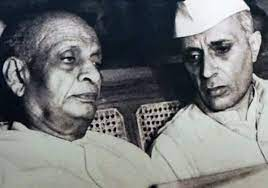"For Nehru, there was never any question that his ancestral home belonged to India but when it came to repelling thousands of tribal militias swarming towards Srinagar, he equivocated". -- says author John Zubrzycki.
His latest book 'Dethroned Dethroned: Patel, Menon and the Integration of Princely India' is in public discourse for quite sometime now.
Zubrycki in an article 'The Hindu' (published Aug 13th, 2023), also says: "...when his daughter Indira Gandhi used her majority to pass a Bill in the Lok Sabha de-recognising the rulers abolishing their privy purses. Had Nehru been alive he would have applauded the move, but not Patel who would have viewed her actions as a final betrayal".
VP Menon worked in complete synchronicity with Sardar Vallabhbhai Patel on the crucial issue of integrating the Princely States, noted:
- “Leadership is of two kinds — a leader like Napoleon, who was master of both policy and detail, wanted merely the instruments to carry out his orders. Sardar’s leadership was of a different category — having selected his men, he trusted them entirely to implement his policy without full and frank consultation.
Whenever we entered into any discussion, we did so as personal friends rather than minister and secretary (in the Ministry of States).”
There will be another quote to reflect upon. Rajmohan Gandhi wrote: Patel, who had used sharp language for Nehru, was also the one who had written to Jawaharlal in August 1947: “My services will be at your disposal, I hope, for the rest of your life and you will have unquestioned loyalty … from me … Our combination is unbreakable and therein lies our strength.”
In February 2020 there was a controversy over a tweet from External Affairs Minister Dr S Jaishankar. He said, "Exercise of writing history for politics in the past needs honest treatment. "When Sardar died, a deliberate campaign was begun to efface his memory. I know this, because I have seen it, and at times, I fell victim to it myself. " So says VP Menon. Actually, Dr Jaishankar only referred to what Narayani Basu had claimed.
Dr Jaishankar also wrote: "Learnt from the book that Nehru did not want Patel in the Cabinet in 1947 and omitted him from the initial Cabinet list. Clearly, a subject for much debate. Noted that the author stood her ground on this revelation."
Many tried to rubbish the claim. Congress leader Jairam Ramesh also had joined the issue.
However, Dr Mujibur Rahman Faculty, Jamia Millia Islamia & editor, ‘Rise Of Saffron Power’, later said, "I was, in fact, present at the panel discussion ..... I have a different interpretation of Jaishankar’s claims (based on Basu’s book) that Patel’s name did not figure in Nehru’s first list of Cabinet members. Patel’s name wasn’t the only one to be left out. Even B.R. Ambedkar and Maulana Azad weren’t included until Gandhi intervened.
"I am not sure about the exact list, but it was in the context of general discussions over Nehru ‘s choice of Cabinet members. Nehru did not have an ill-feeling for excluding Patel’s name. That said, Nehru did have fundamental differences with Patel on minority rights and economic development."
Rajmohan Gandhi wrote: “The Patel-Nehru conflicts are well known. At the end of 1949, when the first President for the Republic had to be found, Nehru wanted Rajaji but after an initial ambivalence Patel supported Rajendra Prasad, who was chosen.
“In August 1950, the Sardar was again on the winning side, and Nehru on the losing, when Purshottam Das Tandon won a contest for the Congress presidentship, defeating Acharya Kripalani, whom Nehru had backed. Bitter words marked both contests, but the relationship did not break.
“If unaware of other facts, the reader of these diary entries will believe that over Kashmir, Hyderabad and the Indo-Pak Pact of 1950, the Nehru-Patel differences were unbridgeable. But were they? While disliking the reference of Kashmir to the UN, Patel went along with the removal of Hari Singh, the empowerment of Sheikh Abdullah and the provision of Article 370.
“As for the Nehru-Liaqat Pact of April 1950, over which Shyama Prasad Mookerjee resigned from the Union cabinet, Patel pledged his ‘whole strength and energy to making a success of the Agreement and vindicating the stand of the Prime Minister,’ and he also pointed out that “ugly and deplorable incidents from our side” had “weakened our position”.
“On his part, though unsure of the timing of Patel’s Hyderabad operation, Nehru went along with it. Historically, which is more remarkable — the Patel-Nehru differences, which were undoubtedly important, or the fact that the two stayed together? Those riveted only by the differences have to face some ambiguities.
“Thus in the Diary, Patel says conflicting things about Kashmir. While on July 23, 1949, he seems to want to do “battle for the whole of Kashmir” (p.291), on September 27, 1950, referring to Kashmir, the Sardar tells R.K. Patil: “Now how long can India bear this burden.” (courtesy siasat.com)






No comments:
Post a Comment